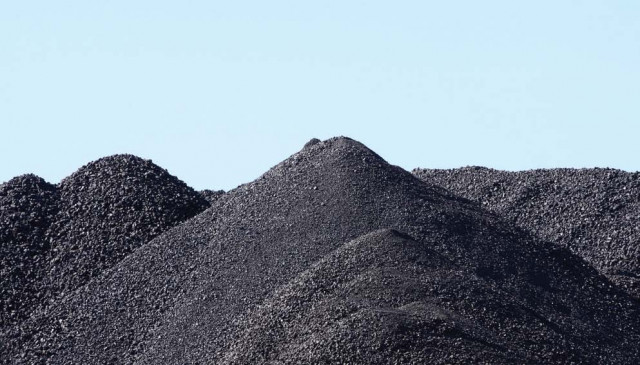Indian government moves to quell $211b coal furore
Uncertainty over the coal contracts will add to investors' confusion about doing business.

The prime minister's office called the estimated loss "exceedingly misleading," after the report - leaked from the federal auditor and published in the Times of India - prompted lawmakers to demand an explanation and rattled investors.
The auditor later backed away from the loss calculation and said its thinking had changed. Prime Minister Manmohan Singh, who oversaw the coal ministry during some of the period covered by the report, made no comment during his appearance in parliament on Thursday.
Singh has lurched from crisis to crisis since massive graft in the sale of telecoms spectrum surfaced two years ago, culminating in the quashing of licenses. The telecoms sale may have cost the government up to $36 billion.
The uncertainty over the coal contracts will add to investors' confusion about doing business in one of the world's fastest-growing economies.
The leaked draft from the Comptroller and Auditor General's (CAG) office criticised the allocation of 155 coalfields to about 100 private and some state-run firms between 2004 and 2009, questioning why they were not auctioned off to the highest bidder.
"This is the mother of all scams," said Venkaiah Naidu, a senior leader in the opposition Bharatiya Janata Party, which forced parliament to briefly adjourn over the report. "The prime minister should reply," he said.
However, while the published excerpts criticised the government's methods, they stopped short of direct accusations of graft.
The firms mentioned include a subsidiary of the world's largest steel maker, ArcelorMittal, whose shares were trading down 3.2 percent in Amsterdam.
The draft said the policy undervalued the coal by at least 10.7 trillion rupees, or $211 billion at today's exchange rate. But in a letter to the prime minister on Thursday, the auditor described the low-priced sales as an "unintended benefit" to companies that did not mean an equivalent loss to the exchequer.
"The leak of the initial draft causes great embarrassment as the Audit Report is still under preparation. Such leakage causes very deep anguish," the auditor said.
The letter was quickly tweeted by the prime minister's office in an apparent attempt to prevent a repeat of the telecoms crisis that last year sparked huge street protests and landed a minister and several company executives in jail.
Voters punished the ruling Congress party in regional elections last month. Last week, a coalition partner forced the railways minister to resign and on Thursday the government rolled back a plan to raise train fares - the latest humiliating U-turn in the sort of economic reforms investors say are needed.
In recent months, the hamstrung administration has flip-flopped on everything from foreign investment in supermarkets to a ban on cotton exports, creating a sense of paralysis at a time when economic growth has slipped sharply below the government's ambition of 9 percent.
Any suggestion of lost revenues also underlines the weakening state of the central government's finances. The budget deficit is expected to blow out to 5.9 percent of GDP this fiscal year from a goal of 4.6 percent, leaving the government financially stretched for the upcoming year and ahead of elections due by 2014.
Coal, steel and power
India is the world's third-largest coal producer after China and the United States, but output has struggled to keep up with consumer demand for electricity.
The government handed out the coalfields at the centre of the controversy for a nominal cost to operators who promised to use the coal for their own power, steel and cement projects.
Many of the allotted fields have yet to be handed to the companies because of bureaucratic wrangles and environmental regulation.
"There are so many ifs and buts in this story," said a senior Indian industry executive, who declined to be identified because of the political sensitivity of the matter.
"Many of the blocks are uneconomic, you have to share between two or three parties and most of these blocks have hardly been explored at all. So remember, you would have to spend hundreds of millions of dollars in exploration, development and infrastructure to exploit them," he said. "I think it will be forgotten quickly."
Coal Minister Sriprakash Jaiswal said the government did not seek profit from the allocation of coalfields. Instead, its priority was to stimulate growth in industry. New coal blocks will be auctioned, he said.
"We are working on putting auction norms for competitive bidding for new coal blocks. The process will soon be in place," Jaiswal told reporters.
ArcelorMittal India is a partner in two assets in India's coal belt and intends to build large steel plants with a capacity of 12 million tonnes a year linked to the fields.
However, these fields are so far only at a prospecting stage.
"We were allocated suitable blocks on merit along with JV partners and in accordance with the government's policy and we have been working towards development of the same," a spokeswoman for the company said.
State-run power company NTPC told Reuters it had made no windfall profits from the allocations and that the lower costs meant cheaper electricity for consumers.
A sub-index of Indian steel stocks dropped 3.3 percent, while Mumbai's benchmark index closed down 2.3 percent.



















COMMENTS
Comments are moderated and generally will be posted if they are on-topic and not abusive.
For more information, please see our Comments FAQ